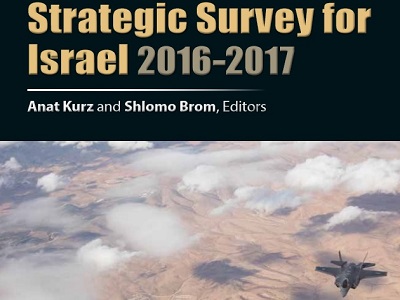
By Hanna Kawas
The Israeli Institute for National Security Studies has just issued its 275 page report entitled “Strategic Survey for Israel 2016-2017”. This Israeli research institute and think tank is headed by former IDF Military Intelligence Chief, General (ret.) Amos Yadlin. Its analysis offers a valuable insight into the how the Israeli intelligence and security community view and prioritize developments regionally and globally, and in the process, also exposes who are the real friends and enemies of Israel in the Arab world.
Following are a small sampling of the findings and the recommendations (labelled “challenges and responses”) contained in the report’s summarized conclusion:
* “Israel’s peace treaties with Egypt and Jordan have withstood the tumult in the Arab world. The Cairo and Amman embassies in Tel Aviv are an expression of a stable element in the regional system, and constitute an important part of Israel’s strategic position.” Page 252
* “The change in Saudi policy has expanded Riyadh’s base of shared interests with Israel, thereby facilitating closer ties between the two countries and possibly encouraging Saudi Arabia to make those ties public.” Page 252
* “From Israel’s standpoint, the non-state actors in the region are deeply involved in fighting for their existence, making them less able to concentrate on the struggle against Israel mandated by their ideology. The Islamic State branch that controls territory bordering Israel in the Golan Heights is for the most part inactive against Israel.” Page 249
* “Although Hezbollah continues its military buildup and poses a significant strategic threat to Israel, and despite the substantial resources invested by Hamas in rebuilding its military force, Israel’s overall strategic position gives it unprecedented freedom of action to initiate military operations aimed at preserving its security interests and restricting the increase in quality of its enemies’ military buildup.” page 250
* “The complete standstill in the political process and the deterioration of security in the Palestinian arena continued in 2016, and Israel continues to pay a price in lives, and in its economy, international standing, and internal political arena.” Page 253
* “Israel’s image in Western countries continues to decline, a trend that enhances the ability of hostile groups to engage in actions aimed at depriving Israel of moral and political legitimacy and launch boycotts in various areas. Indeed, the international campaign to delegitimize Israel continues, as reflected in the BDS movement. Israel’s current right wing government has contributed to this deterioration.” page 254
* “… the worst scenario is a conflict with Hezbollah on the border with Lebanon. Conflicts in the Gaza Strip will probably be limited, and Israel is well equipped to deal with them.” Page 255
The Recommendations:
– “Even if there does not appear to be a partner on the Palestinian side for reaching or implementing an agreement, Israel has an important interest in halting the gradual drift toward an irreversible one-state situation, and instead, progressing toward a two-state situation that ends Israel’s rule over Palestinians, while carefully maintaining and even improving Israel’s security.” Page 257
– “Israel must prepare measures against Lebanon’s national infrastructure without distinguishing it from Hezbollah, and develop capabilities for a ground campaign…” Page 259
– “Against Hamas in the Gaza Strip, military preparation should aim to shorten the duration of the next campaign and anticipate the tactical and systemic surprises that will be encountered.” Page 259
– “Both arenas, against Hamas and Hezbollah, should be discussed with the Trump administration, with understandings reached about Israel’s red lines, and about what will be considered a legitimate policy on the use of force against these groups in the event of another military conflict.” Page 259
– “The dialogue between Israel and Saudi Arabia and other Gulf states indicates that an effective process with the Palestinians, even if it does not include negotiations for a permanent settlement ending in a full agreement, will make a breakthrough in relations with the Gulf states possible, including making these relations public.” page 260
– “Israel can expect conflicts in both the military sphere and in soft power areas – economics, diplomacy, communications, the social networks, and the courts (lawfare)…It is therefore necessary for Israel to devise organizational frameworks, strategies, and multidimensional, coordinated methods to handle the challenges facing it.” Page 260
– Hanna Kawas is Chairperson of the Canada Palestine Association and co-host of Voice of Palestine. He contributed this article to PalestineChronicle.com. Visit: http://www.cpavancouver.org.





